By Bishop Robert Barron
I’m in the process of re-reading a spiritual classic from the Russian Orthodox tradition: The Way of a Pilgrim. This little text, whose author is unknown to us, concerns a man from mid-nineteenth century Russia who found himself deeply puzzled by St. Paul’s comment in first Thessalonians that we should “pray unceasingly.” How, he wondered, amidst all of the demands of life, is this even possible? How could the Apostle command something so patently absurd?
His botheration led him, finally, to a monastery and a conversation with an elderly spiritual teacher who revealed the secret. He taught the man the simple prayer that stands at the heart of the Eastern Christian mystical tradition, the so-called “Jesus prayer.” “As you breathe in,” he told him, say, ‘Lord Jesus Christ,’ and as you breathe out, say, ‘Have mercy on me.’” When the searcher looked at him with some puzzlement, the elder instructed him to go back to his room and pray these words a thousand times. When the younger man returned and announced his successful completion of the task, he was told, “Now go pray it 10 thousand times!”
This was the manner in which the spiritual master was placing this prayer on the student’s lips so that it might enter his heart and into the rhythm of his breathing in and out, and finally become so second nature to him that he was, consciously or unconsciously, praying it all the time, indeed praying just as St. Paul had instructed the Thessalonians.
In the power of the Spirit, the young man then set out to wander through the Russian forests and plains, the Jesus prayer perpetually on his lips. The only object of value that he had in his rucksack was the Bible, and with the last two rubles in his possession, he purchased a beat-up copy of the Philokalia, a collection of prayers and sayings from the Eastern Orthodox tradition. Sleeping outdoors, fending largely for himself, relying occasionally on the kindness of strangers, reading his books and praying his prayer, he made his way.
One day, two deserters from the Russian army accosted him on the road, beat him unconscious and stole his two treasures. When he came around and discovered his loss, the man was devastated and wept openly: how could he go on without food for his soul? Through a fortuitous set of circumstances, he managed to recover his lost possessions, and when he had them once again, he hugged them to his chest, gripping them so hard that his fingers practically locked in place around them.
I would invite you to stay with that image for a moment. We see a man with no wealth, no power, no influence in society, no fame to speak of, practically no physical possessions — but clinging with all of his might and with fierce protectiveness to two things whose sole purpose is to feed his soul. Here’s my question for you: What would you cling to in such a way? What precisely is it, the loss of which would produce in you a kind of panic? What would make you cry, once you realized that you no longer had it?
And to make the questions more pointed, let’s assume that you were on a desert island or that you, like the Russian pilgrim, had no resources to go out and buy a replacement. Would it be your car? Your home? Your golf clubs? Your computer? To be honest, I think for me it might be my iPhone. If suddenly I lost my ability to make a call, my contacts, my music, my GPS, my maps, my email, etc., I would panic — and I would probably cry for sheer joy once I had the phone back, and my fingers would close around it like a claw. What makes this confession more than a little troubling is that, 10 years ago, I didn’t even own a cell phone. I lived my life perfectly well without it, and if you had told me then that I would never have one, it wouldn’t have bothered me a bit.
What I particularly love about the pilgrim is that he was preoccupied, not about any of the passing, evanescent goods of the world, but rather about prayer, about a sustained contact with the eternal God. He didn’t care about the things that obsess most of us most of the time: money, power, fame, success. And the only possessions that concerned him were those simple books that fed his relationship to God. Or to turn it around, he wasn’t frightened by the loss of any finite good; but he was frightened to death at the prospect of losing his contact with the living God.
So what would you cling to like a desperate animal? What loss would you fear? What do you ultimately love?
(Bishop Robert Barron is an auxiliary bishop of the Archdiocese of Los Angeles and the founder of Word on Fire Catholic Ministries.)
Author Archives: Maureen Smith
Post-election work for Catholics: reconciliation, healing.
By Carol Zimmermann Catholic News Service
WASHINGTON (CNS) — All the distrust, vitriol and rancor stirred up during the 2016 presidential election campaign did not go away when votes were tallied.
The Nov. 8 election’s outcome, for many, only added more layers of frustration, anger and fear, prompting dozens of protests across the country.
Political leaders, including Hillary Clinton, President-elect Donald Trump and President Barack Obama, acknowledged the disunity and urged people after the election to try to work together.
Catholic leaders have been making similar pleas, not only for the nation, but also recognizing the division that exists among the church’s own members who split their vote
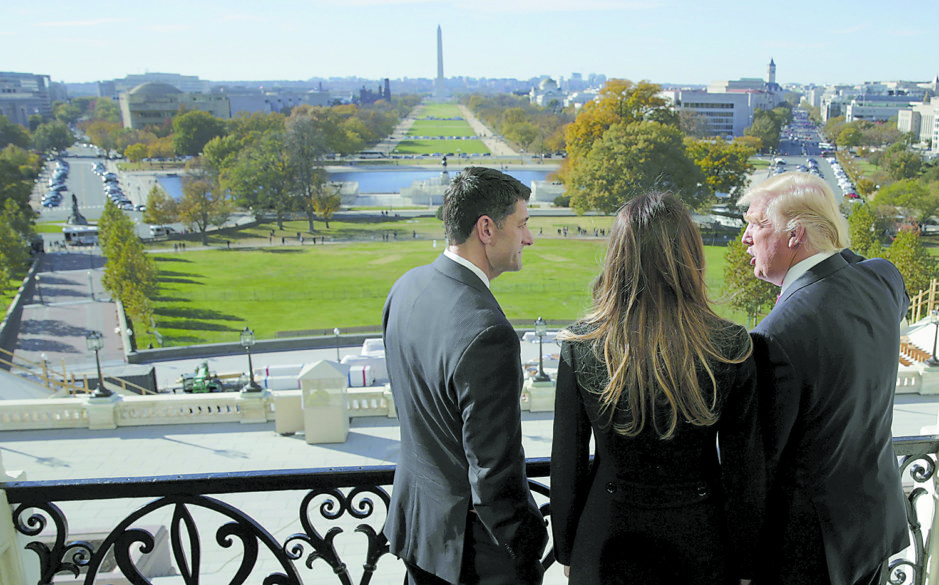
U.S. House Speaker Paul Ryan, R-Wis., shows Melania Trump and U.S. President-elect Donald Trump the Mall from his balcony on Capitol Hill in Washington Nov. 10. (CNS photo/Joshua Roberts, Reuters) See WASHINGTON-LETTER-ELECTION-UNITY Nov. 11, 2016.
— 45 percent for Clinton and 52 percent for Trump.
Four days before the election, Supreme Knight Carl Anderson, CEO of the Knights of Columbus, told a Catholic group in Arlington, Virginia, that regardless of the election’s outcome, “our country will remain deeply divided and those divisions are, to a very real extent, also reflected within our own Catholic faith community.”
The question before Catholics, he said, is whether we will be “a source of unity and reconciliation, or whether we will be a cause of further division.”
That view also was expressed in a Nov. 9 editorial in the National Catholic Reporter newspaper describing the political climate as a “profound moment in our nation’s history and in our church’s history. … The question now is whether we have the courage and leadership to confront these hurts, work for justice and begin the healing process.”
Putting it even more succinctly was an Election Day tweet by Cardinal-designate Joseph W. Tobin of Indianapolis: “Whatever happens at the polls, God will reign. Our work begins tomorrow, building bridges and healing wounds.”
Archbishop Joseph E. Kurtz of Louisville, Kentucky, and president of the U.S. Conference of Catholic Bishops, said: “Every election brings a new beginning. Some may wonder whether the country can reconcile, work together and fulfill the promise of a more perfect union. Through the hope Christ offers, I believe God will give us the strength to heal and unite.”
And Sister Simone Campbell, executive director of the Catholic social justice lobbying organization Network, said her faith dictates that “now, more than ever, we need to mend the gaps and bridge the divides among us.”
“If anger fueled the election, we need to listen deeply to this reality, not dismiss it,” said the Sister of Social Service. “The temptation is to immediately think about how we will fight back, but fighting back will only reinforce this mess we’re in. Instead, we have to fight for a vision that eases people’s fears, brings us together and solves problems.”
Days before the election, Jesuit Father Jim Martin, author and editor at large at America, a weekly magazine published by the Jesuits, said after the election Catholics might want to say the “Prayer for Christian Unity,” which is meant for interfaith unity but has an apt message at a time when many “will feel excluded and unwelcome.”
It turns out the Catholic “Prayer for After an Election” also highlights unity, asking God to “heal us from our differences and unite us, O Lord, with a common purpose, dedication and commitment to achieve liberty and justice in the years ahead.”
The very notion of unity after a more contentious presidential campaign than most can remember might seem far-fetched but some Catholics stress it should at least start at the parish level.
Father Thomas Berg, vice rector and professor of moral theology at St Joseph’s Seminary in Yonkers, New York, said the differences of opinion revealed in this election “should never be allowed to become occasions of separation and rupture. Disagreement is an invitation to encounter, dialogue and to witness to the faith we presumably share.”
“Postelection, at the parish level, how wonderful it would be if we could engage each other dispassionately in calm rational dialogue about our differences with regard to the candidates,” said the priest, who is currently writing a book, “Hurting in the Church: A Way Forward for Wounded Catholics.”
Zach Flanagin, a professor of theology and religious studies at St. Mary’s College of California in Moraga, similarly suggested old-fashioned dialogue saying Catholics should take their cue from Pope Francis who has spent a good part of his pontificate accompanying people and listening to them.
“It’s incumbent at a time like this when there is so much division that we sit down and listen to people,” he told CNS on Election Day.
One way for this to happen in parishes — which he said “can be as divided as communities” — would be in for parishes to host dinners where parishioners have the chance to talk to each other about what matters to them. They might not agree with each other, he said, but they will likely come away respecting the other person.
Flanagin said he has seen programs like this work in high schools and junior high schools that have recognized the need to bring diverse communities together to help heal toxic environments.
Sherry Weddell, co-founder of the Catherine of Siena Institute, a group based in Colorado Springs, Colorado dedicated to strengthening parishes and lay Catholics, said the big post election question is: “How can we help rebuild our relationships with one another now that the shouting is over?”
For Catholics, she said the answer is found in embracing the church’s mission in outreach to others. “Being apostles together slowly builds remarkably strong bridges of trust and hope over the divides that separate us,” she said, adding that doing this “can actually heal and transform us as well.”
And for many, part of the mission is simply to keep up the work at hand and encourage others not to lose hope.
Peggy Lewis, interim dean of business and graduate studies at Trinity Washington University in Washington, said she advises students who are disheartened by the election, especially immigrants covered by the Obama administration’s Deferred Action for Childhood Arrivals program, or DACA, that the “fight is still on.”
Lewis, highlighted with Trinity students in a Nov. 9 Chronicle of Higher Education news video, said she has been urging these students not to give up.
“Getting students from anger, where I still am, to thinking about the future, is something we’re striving to do,” she said.
Los Angeles Archbishop Jose H. Gomez, during a Nov. 10 interfaith prayer service for peace, solidarity and unity at the Cathedral of Our Lady of the Angels, offered similar encouragement to the immigrant community after the election.
“Tonight in America, children are afraid. Men and women are worried and anxious, thinking about where they can run and hide,” he said.
“The answer is not angry words or violence in the streets. It never solves anything. It only inflames it more. We need to be people of peace, people of compassion. Love not hate. Mercy not revenge,” he said. “These are the tools to rebuild our nation and renew the American dream. Tonight we promise our brothers and sisters who are undocumented: We will never you leave you alone.”
– – –
Follow Zimmermann on Twitter @carolmaczim.
Retired Religious Collection Dec. 10-11
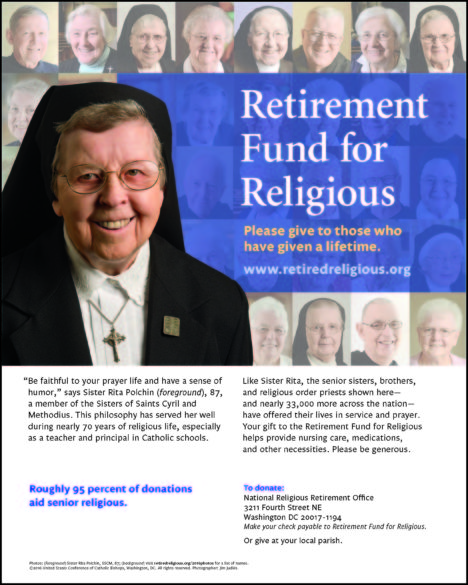
Greenville School unified, blessed
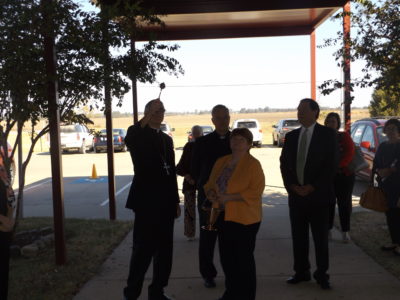
Bishop Joseph Kopacz, left, blesses the new entryway into Greenville St. Joseph and Our Lady of Lourdes school, assisted by Catherine Cook, superintendent of Catholic Schools, and Father Bill Henry, pastor in Greenville.
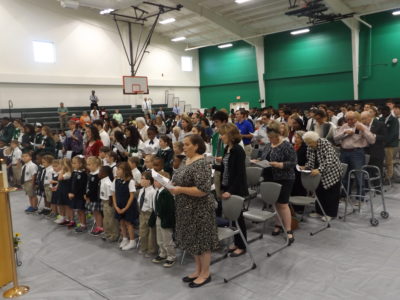
Before each room was blessed, the entire school community gathered for a Mass in the gym. Capital Campaign Chairman Britt Virden told the crowd that the new structure represented a $10 million investment in the community. The schools have been on separate campuses since 1964. St. Joseph High School has been on the VFW Road campus for more than 10 years. (Photos by Missi Blackstock)
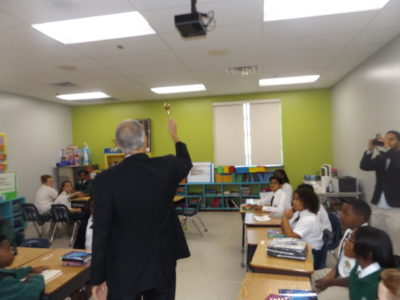
GREENVILLE – Bishop Joseph Kopacz, center, blessed the first graders and their classroom as part of blessing the new facility at St. Joseph School on Thursday, Oct. 27. The blessing was the final chapter in a years-long effort to get St. Joseph High and Our Lady of Lourdes Elementary schools on the same campus. Elementary students use 11 classrooms, nine more are for middle and high school students. The facility also has two science labs, a computer and business lab, resource, art and music rooms, a media/library center, chapel and gymnasium.
Teens seek vocations through SEARCH retreat
By Abbey Schuhmann
High school juniors and seniors from across the Diocese of Jackson gathered at Camp Wesley Pines near Hazlehurst Nov. 11-13 for the fall diocesan SEARCH Retreat. SEARCH is a Catholic youth retreat that models the Cursillo retreat for adults but designed for youth in grades 11th-12th who have a strong desire to deepen their faith and relationship with Christ.
A retreat “for teens, led by teens,” SEARCH is an experience like none other with a strong focus on vocations. It engages youth in a special way and calls them to live out their Catholic faith in a bold, real, active and healthy way.
SEARCH first started in this diocese in the 1970s but interest in it declined in the 1980s. In 2003, Father Mike O’Brien and Father Frank Cosgrove approached Jackson St. Richard parishioners Ann and Jeff Cook and encouraged them to re-introduce the SEARCH retreat to the diocese.
Having lived in Austin, Texas, and participated with multiple SEARCH retreats there, the Cooks coordinated bringing in a team from Austin to lead the first SEARCH retreat in nearly 20 years for our Diocese in January 2004. The first youth staff from the diocese led the next SEARCH retreat under the leadership from volunteers, Ann and Jeff Cook in May of 2004.
During the past 13 years, the diocese has held more than 25 SEARCH retreats under the leadership of the Cooks.
Much of what happens in the retreat is kept a mystery but a few things are certain – you will have fun, you will be challenged to grow in your faith and chances are you will make a few new friends.
The retreat team is primarily made up of a youth staff from teens who have previously attended a SEARCH retreat. Once a teen attends a SEARCH retreat weekend, he or she has the opportunity to apply to staff future retreats.
The adults who are present throughout the weekend serve “behind the scenes.” It is the teens who lead this retreat. The SEARCH model really gives our youth the opportunity to demonstrate and carry out servant leadership. This retreat would not be possible without the help of adult volunteers who have served in this ministry for so many years.
We are especially grateful to Ann and Jeff Cook for continuing to serve as the volunteer, adult SEARCH coordinators. Without their dedicated service, this ministry would not be where it is today.
The SEARCH ministry is alive and well in the diocese and the SEARCH family continues to grow through each retreat.
The Office of Youth Ministry is currently looking at dates in 2017 for future SEARCH retreats. We are always looking for adults who are open to serving in the SEARCH ministry. If you are interested, contact Abbey Schuhmann, coordinator for the Office of Youth Ministry, abbey.schuhmann@jacksondiocese.org, 601-949-6934.
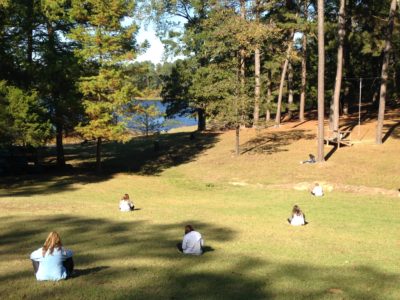
Teens on SEARCH retreat take time for prayer outside. (Photos by Abbey Schuhmann)
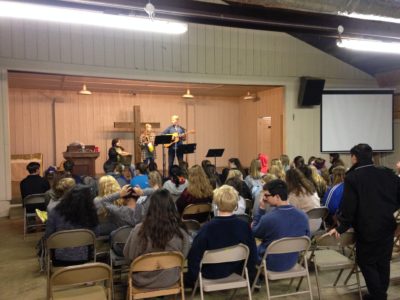
Young people on the Search retreat spend time at liturgies such as this one. Tim Cook and Ellie Smith led music during the retreat.
Turn back time: visit Cranfield St. John the Baptist mission
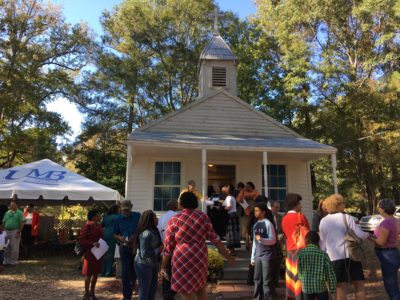
Cranfield St. John the Baptist mission is a country church, often the Sunday home to Louisiana Catholics who are visiting nearby hunting camps.
By Mary Woodward
CRANFIELD – On Sunday, Nov. 6, a beautiful, fresh autumn day, more than 100 people gathered with Bishop Joseph Kopacz to mark the centennial of St. John the Baptist Mission at an early afternoon Mass. The wood-framed church holds roughly 50 people. The overflow congregation was sheltered in a tent outside under the trees.
Shortly before the Mass was scheduled to begin at 1 p.m., a communicant arrived on a four-wheeler, reflecting the mission’s proximity to nearby hunting camps where many Louisiana Catholics come during hunting season. She zipped in and parked opposite the tents and took her place among the congregation.
The windows of the church were wide open and the breeze of the day kept the natural flow of creation present as those gathered entered into the Divine Liturgy. The setting of the day brought us back to 100 years ago when Bishop John Gunn, SM, preached an eloquent sermon on the parable of the Good Samaritan likening the Cranfield mission to the protagonist who cared for the one in need.
The history of the mission is a prime example of a dedicated shepherd who traversed fields and valleys, climbed hills and braved thickets to find his flock. In his time Father Matthew Morrissey, SSJ, became known as the “Father of Missions” in the southwest corner of the diocese.
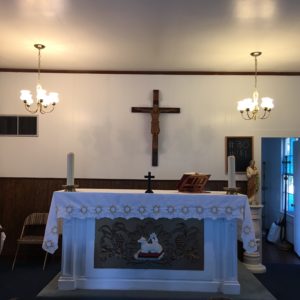
The inside view of the church.
The Natchez ministry of Father Morrissey began in 1901 when he arrived at Holy Family Church. The parish was established in 1890 to serve African American Catholics in the Natchez area. Having been invited by Bishop Thomas Heslin, the Josephites have staffed Holy Family since 1895.
Under Father Morrissey, Holy Family soon became the mother church of four missions – Cranfield, Harriston, Laurel Park and Springfield. On Monday mornings after his weekend duties at Holy Family, Father Morrissey would head out into the county in search of any Catholics and also those who were not church-going. During his circuit he often came upon Catholics who were not able to get into Natchez very often to receive the sacraments. This is where the story of Cranfield has its roots.
According to a history of the Cranfield mission written in 1945 by Father Arthur Flanagan, SSJ, pastor of Holy Family at the time, Soon after his arrival in Natchez, Father Morrissey came upon the Irish Catholic family of John Gordon Fleming living on the outskirts of Cranfield. Fleming told Father Morrissey the family originally came from County Mayo, Ireland in the late 1870s. Fleming’s relative, Holliday Fleming, was the oldest son of the immigrants and brought with him his wife and children. The family would go to Mass in Natchez at St. Mary on Easter and Christmas – weather permitting. The children were all baptized and received sacraments from St. Mary.
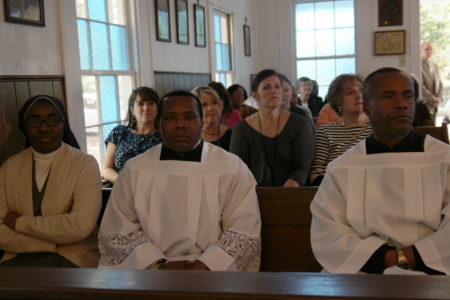
Before the anniversary Mass, Father George Ajuruchi, SSJ, was installed as pastor at Natchez Holy Family and Fayette St. Anne. Some of his friends and family, pictured above, from his home country of Nigeria came for the day of celebrations. (Photo by Valencia Hall)
The next half of the story told by Fleming holds a true Mississippi cultural twist and a wonderful image of the people of God. Fleming explained to Father Morrissey that Holliday Fleming had been “true to his name, [and] went holidaying with the result that he was blessed” with a growing African-American family. Father Morrissey made sure these children were brought to Holy Family for sacraments and given their father’s name.
Soon after meeting the Flemings, Father Morrissey laid plans to build a church in Cranfield. After a few years of saving pennies and nickels from various appeals, there finally were enough funds to build the church on the land donated by Mrs. Boggart, a local Catholic. The mission priest, along with the older African-American Fleming children, built the church themselves. As great artists often sign their masterpieces, Linda Floyd, a descendant of the original Fleming family, relayed that the young men who worked on the church inscribed their names in the steeple.
Initially religious education, taught by Rosie Washington, was held in the church as there was no other building on the site. In 1938, a bus from Natchez came to bring the children to St. Francis School at Holy Family. On the weekend when Mass was not celebrated in the mission the bus often was used to bring people from the missions to Mass at Holy Family.
As the years passed, the other three missions closed. Today Cranfield is the last of the four built by Father Morrissey. His missionary zeal reflects the true spirit of our diocese as a rural mission territory. For Bishop Kopacz – 100 years later – the day began in Natchez with the installation of Father George Ajuruchi, SSJ, as new pastor of Holy Family; then we traveled to Fayette St. Anne for Father Ajuruchi’s installation there as pastor.
From Fayette we headed to Cranfield. The road soon became narrower and less paved and we witnessed the terrain of Father Morrissey. Driving from Holy Family to Fayette and then down to Cranfield gave us a great lesson in history and an even greater perspective on mission life in the church.
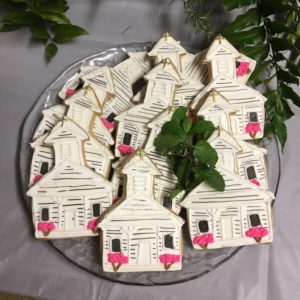
A sweet personal touch to the celebration — cookies made in the image of the church.
It was 100 years ago on Sept. 3, 1916, when Bishop John Gunn, SM, dedicated the mission church built by Father Matthew Morrissey, SSJ, and his flock. Since then many striking autumn days have filled the hearts and minds of the people of this unique mission. For those who live in larger parishes, a trip to Cranfield St. John the Baptist would be good for the Catholic soul.
(Mary Woodward is the diocesan chancellor.)
St. Anthony partners with Level Up Village to work with schools across the world
MADISON – Recently, St. Anthony School, in partnership with Level Up Village, launched their global partnership, the first Level Up Partnership in Mississippi. Dedicated to building a sustained STEM environment inside and outside of the classroom, St. Anthony educators partnered with Level Up Village to work with schools across the world and share their STEM focused program with children in developing countries.
Level Up Village (LUV) delivers pioneering Global STEAM (STEM + Arts) enrichment courses that promote design thinking and one-to-one collaboration on real-world problems between K-9 students in the U.S. and partner students in developing countries.
Kristian Beatty, development director at St. Anthony School, said children work with student partners near the same grade level in developing countries and share their projects, ideas, and thought processes in this global outreach STEM program. “Students and teachers and their global partners communicate via the Level Up internet-based platform through video messaging.
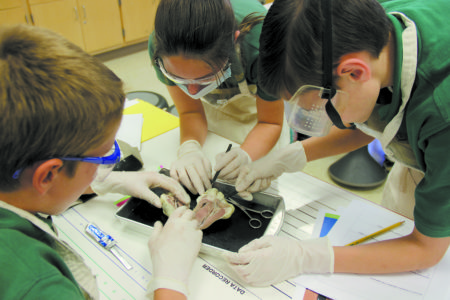
St. Anthony students (l-r) Walt Williams, Zoie Jewusiak and Philip Smith work dissecting a heart during science class. (Photo by Kristian Beatty)
This semester the school is enrolled in three Level Up Village courses:
Second graders are participating in “Global Storybook Engineers” in partnership with students from India and Nicaragua. Beatty said students engineer solutions to rescue storybook heroes while sharing the results of their design challenges with global partners and learning about each other’s lives and cultures in the process.
Fifth graders are engaged in “Global Inventors” in partnership with students from Pakistan and Ghana. Beatty explained that in this project students learn to harness the power of 3D printing and use Computer Aided Design (CAD) software to create and modify a series of designs to produce and 3D print a solar-powered light source in collaboration with their global partner.
Sixth graders are acting as “Global Doctors,” anatomy in partnership with students from Pakistan and Uganda. Students explore the intricacies of the human body systems through real animal specimen dissections. “As “global doctors,” they dissect specimens such as a frog, sheep’s heart, grasshopper, earthworm, and shark,” said Beatty.
Students learn about their global partners’ daily lives and discuss the global diseases that affect specific body systems.
“St. Anthony’s partnership with Level Up enhances their STEM program as students, teachers and global partners work together to develop critical-thinking and problem-solving skills,” noted Beatty. “These skills and their core subject knowledge are then utilized to identify community and global issues and find lasting solutions.” Their partnership will continue in the spring as the entire school will work together on a school-wide project with Level Up Village.
(Story and photos courtesy of Kristian Beatty)
Greenville student athletes honored
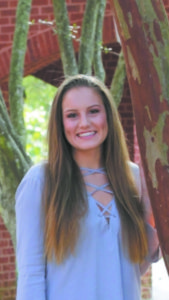
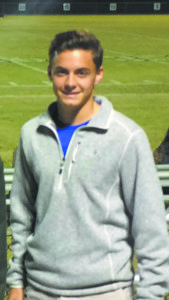
GREENVILLE – St. Joseph School students Tres Santucci and Jennifer Mansour were recently named winners of the Wendy’s High School Heisman Award which highlights exceptional high school seniors and their achievements in the classroom, on the field and in the community.
“We are honored to have two of our students recognized as some of the country’s top student-athletes with the Wendy’s High School Heisman name,” said principal Paul Artman, Jr.
Louis Joseph Santucci, III (Tres), is a member of Mu Alpha Theta, the National Honor Society and is a tennis and soccer player. He is a member of the 2014-2016 State Boys Tennis Team Champions as well as being the 2016 MAIS Boys’ Singles State Champion. Tres volunteers at St. Vincent de Paul as well as being very active at St. James Catholic Church. Tres enjoys participating in helping children read at Carrie Stern Elementary.
Mansour is also a member of Mu Alpha Theta, the National Honor Society and currently serves as Student Government and Mu Alpha Theta president. She is a member of the swim, soccer and cross country teams. Mansour holds the Delta Aquatic Club Swim team record for the 50 meter Freestyle.
Mansour has been the school’s blood drive coordinator for two years.
The Wendy’s High School Heisman Award has honored more than 600,000 of the nation’s most esteemed high school seniors. For 23 years it has recognized outstanding students and rewarded their commitment and achievements to academics, athletics and community on a national level.
Youth News
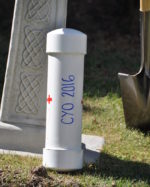
VICKSBURG – Father Tom Lalor, pastor of St. Paul Parish, reads a blessing while CYO members from Vicksburg bury a time capsule on Sunday, Oct. 23, as part of the parish 175th anniversary celebration. The time capsule will be dug up at the church’s 200th anniversary in the year 20
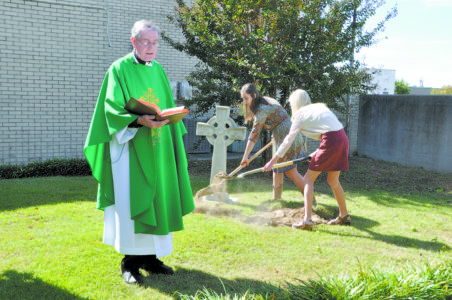
VICKSBURG – Father Tom Lalor, pastor of St. Paul Parish, reads a blessing while CYO members from Vicksburg bury a time capsule on Sunday, Oct. 23, as part of the parish 175th anniversary celebration. The time capsule will be dug up at the church’s 200th anniversary in the year 2041.
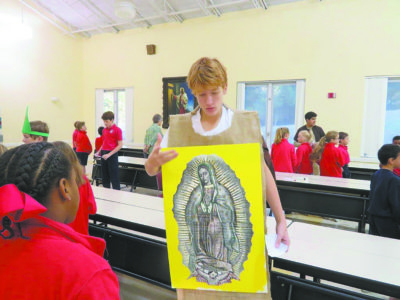
SOUTHAVEN – Sacred Heart School student Students from Southaven Sacred Heart participated on the Feast of All Saints in the eighth graders Live Museum of Saints. Colin Beatty represented Juan Diego. (Photos by Sister Margaret Sue Broker)
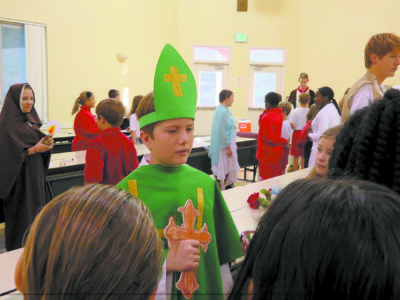
SOUTHAVEN – Sacred Heart School student Students participated in the Feast of All Saints in the eighth graders Live Museum of Saints. Trey Collins dressed as St. Patrick (Photos by Sister Margaret Sue Broker)
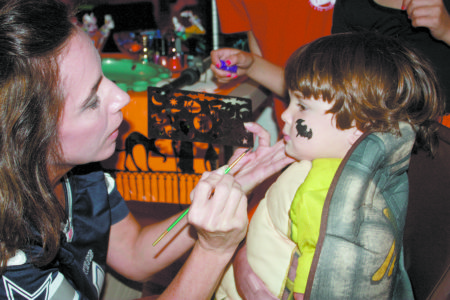
LELAND – St. James Parish youth group and parishioners hosted a “Trunk or Treat” for the children of the parish and community. After a youth Mass, children, dressed in their Halloween costumes, were “treated” to pizza, games and “trick or treating” at tables decorated by individuals and/or families. (Photos by Lisa Zepponi)
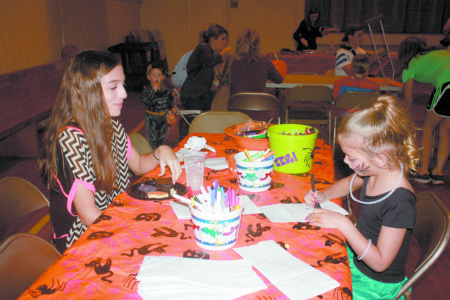
LELAND – St. James Parish youth group and parishioners hosted a “Trunk or Treat” for the children of the parish and community. After a youth Mass, children, dressed in their Halloween costumes, were “treated” to pizza, games and “trick or treating” at tables decorated by individuals and/or families. (Photos by Lisa Zepponi)
Called to Serve: Pray for seminarians, priests, religious
During National Vocations Awareness Week, we ask you to keep the seminarians, priests and religious for the Diocese of Jackson in your prayers. Here is a look at orders serving in the Diocese of Jackson.
Brothers:
Congregation of Christian Brothers, C.F.C
Franciscans, O.F.M.
Missionary Servants of the Most Holy Trinity, S.T.
Priests:
Priests of the Sacred Heart, S.C.J.
Diocesan Priests
Franciscan Friars, O.F.M.
Missionary Servants of the Most Holy Trinity, S.T.
Norbertine Fathers, O.Praem.
Redemptorist Fathers, C.Ss.R.
Society of the Divine Word, S.V.D.
St. Joseph’s Society of the Sacred Heart, S.S.J.
Sisters:
Adrian Dominican Sisters, OP
Congregation of Humility of Mary, CHM
Congregation of Sisters of St. Agnes, CSA
Dominican Sisters of Racine, WI, OP
Dominican Sisters of Sinsinawa, WI, OP
Dominican Sisters of Springfield, IL, OP
Franciscan Sisters of Christian Charity, OSF
Franciscan Sisters of Little Falls, MN, OSF
Franciscan Sisters of Perpetual Adoration, FSPA
Missionaries Guadalupanas of the Holy Spirit, MGSpS
Order of the Discalced Carmelites, OCD
Sisters for Christian Community, SFCC
School Sisters of Notre Dame, Atlantic Midwest Province, SSND
School Sisters of Notre Dame, Central
Pacific Province, SSND
School Sisters of St. Francis, OSF
Sisters of Charity of Nazareth, SCN
Sisters of the Holy Names of Jesus and Mary, US/Ontario Province, SNJM
Sisters of the Holy Spirit and Mary Immaculate, S.H.Sp.
Sisters of the Living Word, SLW
Sisters of Mercy of the Americas, South Central Community, RSM
Sisters of the Presentation of the Blessed Virgin Mary, PBVM
Sisters of St. Francis of the Holy Family, OSF
Sisters of St. Francis, OSF
Sisters of St. Joseph of Carondelet, CSJ
Sisters of St. Joseph of Chestnut Hill, SSJ
Sisters of St. Joseph of Baden, PA, CSJ
Solitary, Diocese of East Anglia, UK
Union of Presentation Sisters, PBVM
